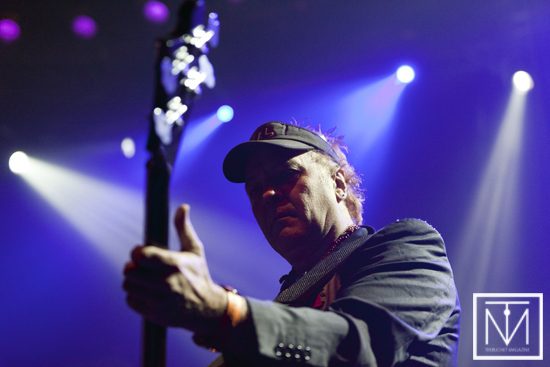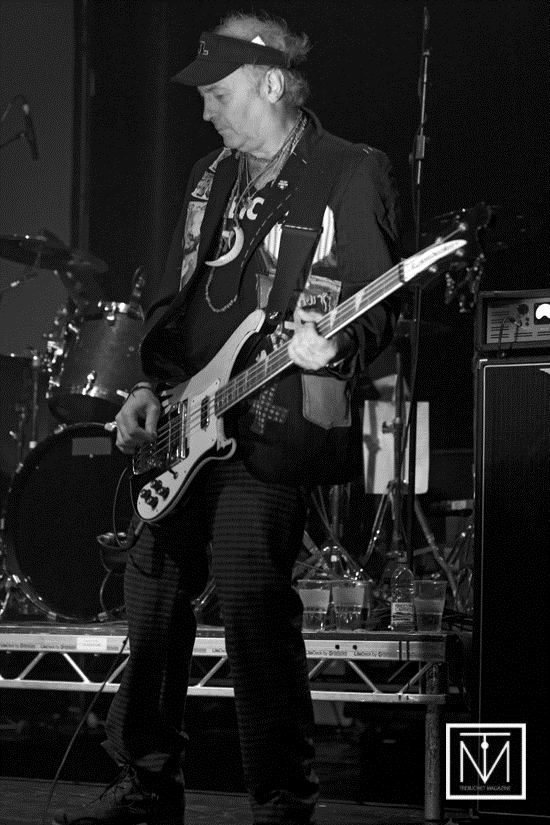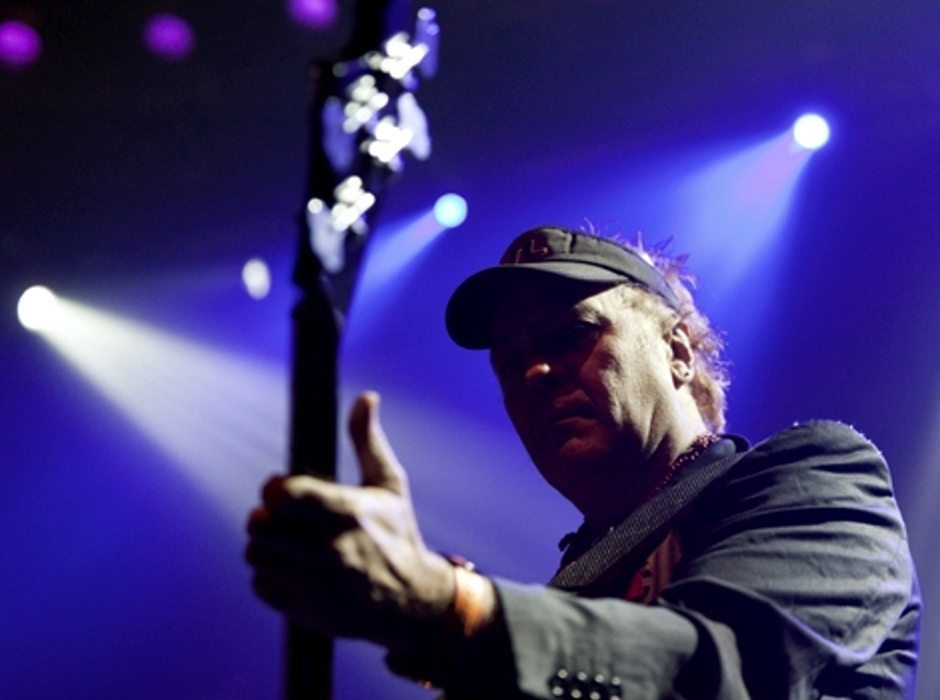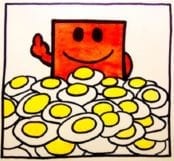[dropcap style=”font-size:100px; color:#992211;”]M[/dropcap]artin “Youth” Glover, known by many as the bassist and founding member of the influential Post-Punk band Killing Joke, is also known as one of the world’s top record producers.
Norman B Skype-interviewed Glover at his home and studio in Spain.
Martin, over the years you’ve worked as a musician and producer, with a list that goes from Killing Joke to Primal Scream to Paul McCartney to The Orb, and on and on. You’ve been involved in all kinds of things, musically. What I’d like to know is, where does Martin Glover see music going? Are you encouraged for the future of music?
Martin Glover: I’m always encouraged by music. Sometimes you have doubts and delusions and you go off the path a bit. I’ve learned that if you give music what she requires, which is a lot of devotion, she kind of rewards you in lots of different ways. I’ve devoted the last 35 years to being creative and working with artists, helping them realize their visions and ideas.
But you know, its cyclical, you’re touching eternity when you’re getting into music. The form of vibration, the frequency. I’ve always been a bit of an outsider, I’ve seen the cycles, you know I think it may be like the early 60’s, even though I was a wee baby then, I’ve seen the changes over the years. We’ve had a recession, that affected the music business.
I saw it coming. About 15 or so years ago, I thought we’ve got to change the way we work. This isn’t sustainable. With the advent of the internet, people could not afford to spend the money that they spent in the 80’s to 90’s on making records. So, I changed the way I worked and, luckily I embraced the technology that was emerging at the time. Which of course did make things a lot faster and a lot more accessible and that enabled me to, you know, get up to steam and pick up the slack, so to speak.
Because, now we don’t have to rent big expensive studios, I can do most of the records at home. Having said that, I’m sitting in my studio in Spain, where I have built a state-of-the-art studio….
You just touched on something… and that is technology. It must have also changed how musicians approached music making? I asked the great reggae drummer Sly Dunbar when electronic drums first appeared, if computerized drums bothered him. “No way man” He said, “I’m gonna use ‘em. It gives me more tools to play with”. Has technology made an impact on your work?
MG: Oh yeah! Its been a bonus. As long as you harness it. Make it work for you and don’t get lost in working for it, which is easy to do. Yeah, it can be liberating. I think Sly Dunbar and a lot of the Jamaican scene really embraced the new technology before a lot of other genres. I mean they were on it straight away. Having said that, it’s very hip for young musicians today to mess about using analogue compressors and stuff. Technology is there to serve your inspiration, if your muse is to record with tape and analogue equipment, then you know, do that! As long as you allow your own ideas to come through.
Let’s get back to where you see music going.
MG: Well, I think we are still in a slump, record companies are gonna have a hard time, especially the majors. There’s a whole tradition of training up engineers. British engineers ruled the world in the last 25 to 30 years, but that whole tradition has gone with the demise of the big studios. We’ll start feeling those repercussions in the next four or five years.
However, music will never die, there will always be people trying to make money out of it. People are resourceful and will always find ways of making a living out of it. It’s certainly a lot easier to get your music up online and being heard now. Doesn’t mean that all the music you hear online is any good, but it’s up there and people do break through.
It reminds me of when I was in Goa, I used to look at these dusty dance floors and throughout the night there would always be one or two people who would emerge, usually a girl and guy, not necessarily together, but they would emerge out of the mass and create the focus and drive the party forward… it’s the same with bands. There is such a saturation of bands, then one or two pop up and they kind of define what we are all feeling at the time. This happens and always will. As far as the future goes, that’s not gonna change. The way we absorb it, the way we consume it, now that will change.
Has there been anything that has come along in the last few years musically, that has surprised you?
MG: You seem to have less and less of those cultural phenomena like Acid House. I suppose the latest one is EDM in America. And like with Punk, it took America 10 years to digest Punk and then reinvent it in its own way….
In the UK, fashions come and go very quickly, but in America it takes much longer, can we go into this a little deeper?
MG: My theory is, it’s so vast. America, it’s geography really. You can’t have a national phenomena in the same way you can in the UK, it takes much longer in America to build up. Bands have to tour for a few years before they can penetrate the US market. It does happen occasionally… ironically some bigger American bands today have to break the UK market first to get their validity and then go back and penetrate their home turf.
Let’s get back to talking about things that have surprised you over the last few years.
MG: Culturally, things have changed a lot with the internet and that’s been good and bad. Its also brought a very short attention span. But is has brought amazing amounts of information to everyone’s fingertips, which has made the public, I think, more aware, more aware than they have every been. Things that were considered underground and avant garde have slipped into the public consciousness.
(Youth and Alex Paterson finding inspiration from Steve Reich’s ‘Electric Counterpoint’)
I work with a lot of young artists and the things they pick up as references are so far and wide. You know, it could be Nick Drake or Abba, it could be Black Sabbath… it’s things that they can reinvent in their own way and they do it their own way. It’s often wrong…. it’s like The XX or something, they play the drum machine by hand, they don’t care if they are in time or not. They break the rules and that’s encouraging I think.
I think it would be great fun being a kid today, there so much territory and geography you can roam around in and take and make into your form of expression.
What are your thoughts on one genre influencing another?
MG: Often you meet artists who say, ‘Oh, I don’t listen to anybody but myself’ and you know they’re not going to go anywhere. It’s shit, without those influences you really kidding yourself. Everybody has influences whether they own up to it or not. Things like the Velvet Underground, who for years have been voted the most influential band in the history of Rock, superseded in the NME by Neu!.
Another good example is Brian Eno, you can hear the Velvet Underground influence on his album Taking Tiger Mountain. There is one track where I had to stop and think, is this a Joy Division track? But no, its Eno sounding like Joy Division sounding like Velvet Underground. It’s a very exciting thing when you hear that in effect, it’s a very Renaissance tradition, it’s a timeless tradition.
It’s a tradition you find in Ireland, with traditional music, it’s an aural tradition of passing on, you can see it with Johnny Cash passing his guitar to Bob Dylan. Today the information is so widely available, kids know where to go for their influences and they can go even further. It’s what great artists do, they take something totally uncool and make it cool.
I want to talk about the influence of reggae. It’s been a huge influence on you. You took the name Youth because of your passion for reggae. Can you talk about that?
MG: Yeah, I was living in a squat, in the late 70’s, some Jamaicans I knew referred to me as Yoot or Youth, but because I was so messy, my mates christened me Pig Youth, ’cause I listened to Big Youth a lot. It kind of stuck, for a while I was known as Pig, but in my 20’s I became Youth and it’s remained ever since. Now I’m in my 50’s, I guess it should be Older or Elder Youth!
Yeah, reggae, right, a massive influence, going to sound systems in the late 70’s. Almost indescribable experience, tiny room, packed with people, wall-to-wall speakers, heavy ganja smoke clouding the almost pitch black room, with this thumping bass that shook you from head to toe. That experience really informed what I wanted in a rock gig, I wanted to be in a band that had that kind of power and feeling… we also shared a rehearsal space with Motorhead, so volume and bass were really important.
Do you refer back to your early experiences when working with a younger band?[quote]I say to people, I retired
when I was 15. I left
school and joined a band[/quote]
MG: You know, I try to recalibrate the way I look at things through their eyes and ears. Then I try and realise what they see and bring some of my experience in and marry the technology with the art. You know I’m always navigating toward the art. As a producer I’ve got enough experience now to know how to use the technology so it doesn’t interfere with the art.
Do you find, or have you found, that one outweighs the other? How difficult is it to keep the balance between art and technology?
MG: Sometimes you sway, especially when I’m composing music myself. I might sway too far, I might start a song and concentrate on the acoustic and then decide to bring in some beats on the laptop. Or it could be vice versa. I’ll start something on the computer and it’s totally electronic, then by the time I’m putting a melody in, I think it may be better mostly acoustic. I use my intuition really.
What starts an idea off for you?
MG: I should say it’s a really deep emotional pain from my childhood, a cry for help that comes out of the abyss, a cry of agony. Sometimes it is that, but generally it’s that I’ve heard a track or something, I’ve been listening and say, “Oh, I like that bassline”, or “I like that groove or that vibe”, then I want to do something like that.
I’ll start by finding something that gives me an association of the track I’m feeling at the time and I may go directly to the source of the track, bring it up, listen to it, play around with it, copy it, whatever. You know the first band I was in at school, we used to just play along to records, you know, the Stones and stuff. In a way, I’m still doing that. I do try to retain my childlike or adolescent attitude to music. I say to people I retired when I was 15, I left school and joined a band.
You know, in a way I did. I’ve stayed at 15, really.
You still perform live, you go out on the road with Killing Joke, is performing live different from when you first got up on stage in 1979?
MG: I was saying to Jaz, we were in some dressing room, I said , “Do you realize we were in this fuckin’ dressing room in when we were 17 and nothing’s fuckin’ changed?”. But, no some things haven’t changed, and never will, but a lot of things have. In the 80’s and 90’s you couldn’t go out without tour support, but now the only way you can make money is through touring, even then, its touch and go. We may sell out tours, but we may only just break even.
Its very hard to pull it off today, whatever level your at, but essentially it’s the main ingredient of what it that we do. Which is taking the music to the people and performing it, and creating events and happenings that transcend the daily modern grind and take us all to place of joy and renewal.
Does an audience makes a difference?
MG: Yeah, absolutely! On one hand, I don’t want to patronize an audience by second guessing what they want or by giving them what I think they want. We still tend to get up there as the four of us and do what we wanna do and hopefully the audience gets into what we’re doing.
There’s always these big debates about should play the hits or not. My argument is yes we should, because there is probably some kid who’ll only get to see us once every five years, so we don’t want him to go away disappointed. So we sprinkle a liberal amount of our history in our set but, at the same time we try to make it challenging for ourselves and for the audience, and give them the respect that we should be giving ourselves as artists. Not become some banal entertainment machine.
What advice would you give to artists coming up now?
MG: I would encourage young people to take risks, break rules and do it their own way. And, I would encourage them to do it earlier. There’s a big trend for kids to go to college to learn music production today, in a way I think its a bit of a scam really. When you’re in your late teens and early 20’s, you don’t want to be in college or university learning about making music, you wanna be out there doing it.
I think its rare these days to see young people seizing the moment, compared to previous generations and that’s a bit scary. So, I would encourage them to get out there and have at it. You know, I think you gotta have a pure heart and fearless wings. In a way it chooses you, but it won’t if you don’t fully commit to it. You gotta be loving what you do… passionately… and you gotta be totally fearless about throwing yourself into the lions’ pit. You gotta be yourself.
You’ve seen the casualties in the music business, how have you managed to survive?
MG: I’ve had my ups and downs. You don’t find anyone who is successful in this business without a whole history of failures around them. I think what I’ve got is a fearlessness about failure. If I fuck up, I’ll get up and fuckin’ do it again, until I stop fuckin’ up. Not everybody has that, I understand that, it’s not for everyone. Not everyone can cope with the downside.
I’ve never been motivated by money. I didn’t get into music to make money, I had nothing until I was 30. I had a lot of hit records, but I had no money, but it didn’t stop me being passionate about being in music. If I had had money, I would have paid to do what I was doing.
What are the pitfalls?
MG: The only problems you are gonna have in life are yourself. Don’t blame other people, do the work yourself, don’t blame the world. It’s your own inner stuff you have to work, work on yourself, work on your ego, develop a humility and confidence but, be humble.
Photos: Carl Byron Batson. Not the be reproduced without express prior permission.
Interviewer Norman B regularly podcasts at LifeElsewhere.
[button link=”http://www.mediafire.com/listen/8k0crap83gk8sp3/1_Life_Elsewhere_.aiff] Norman B Podcast[/button]



















>throughout the night there would always be one or two people who would emerge, usually a girl and guy, not >necessarily together, but they would emerge out of the mass and create the focus and drive the party forward…
They are called DJ’s